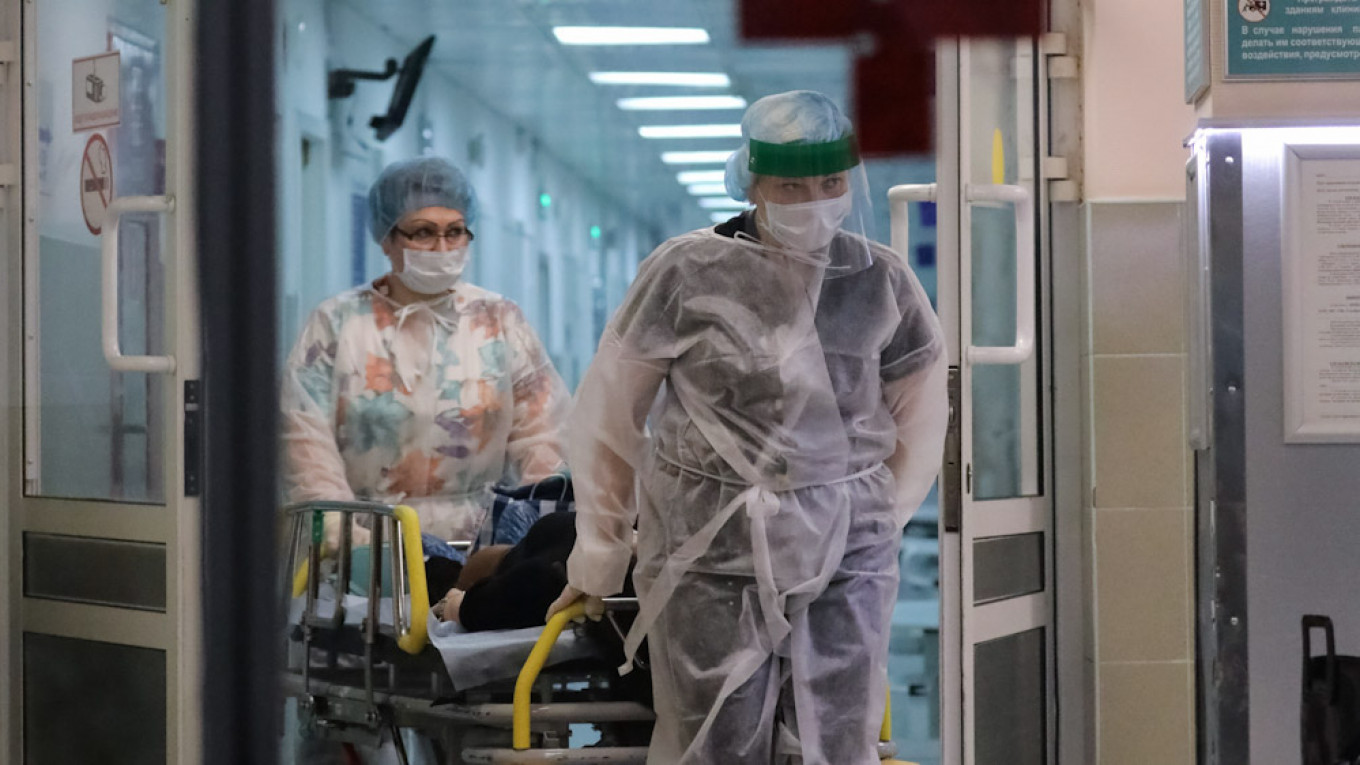The Kremlin has denied keeping secret statistics on the number of coronavirus cases in Russia, after Bloomberg reported government officials warning a third wave of the pandemic has already hit the country.
The newswire on Wednesday quoted two unnamed government sources saying “unofficial statistics” painted a different picture from that presented by Russia’s coronavirus task force, which reported the country’s lowest number of daily infections since September hours after Bloomberg published its story.
Kremlin spokesperson Dmitry Peskov hit back at the claims in a daily press briefing.
“There is no second accounting department,” he told reporters. “You see the numbers — they are available to everyone. There can be no question of a second count and statements to the contrary are absurd.”
Russia’s coronavirus statistics have been heavily questioned since the start of the pandemic. Observers have regularly pointed to apparent inconsistencies in data on the number of cases reported by regions. The country has both one of the world’s highest excess mortality counts and one of the largest mismatches between official coronavirus fatalities and excess deaths — with excesses at least four times higher than the number of reported deaths.
The Kremlin’s denial comes weeks after officials across the country had started warning about the prospect of Russia being hit with a third wave — which swept across Europe earlier in the year. After a model produced by analysts at state-owned Sberbank sparked headlines with a prediction that case numbers in Russia would double during April, the bank quietly stopped publishing updates.
Official case numbers in Moscow have started to creep up, with weekly cases at their highest level since January. Moscow’s flagship Kommunarka hospital has more patients in its intensive care unit than at any point over the last 12 months, head doctor Denis Protsenko said last week — up more than 2.5-times since the end of February. The number of patients on ventilators during April was also higher than during both the first and second waves.
Russia does not publish nationwide or regional information on the number of people currently hospitalized with coronavirus.
“We have always had a lot of patients as we are the biggest Covid hospital in Moscow, but lately there seems to be a steady increase,” Katerina, a 26-year-old nurse based at Kommunarka told The Moscow Times. “We aren’t at full capacity but we’re getting close.”
Other medical staff also reported a mismatch with Russia’s official coronavirus case numbers — which have fallen from 27,000 a day at the start of the year to under 8,000 on Wednesday.
“In our hospital, it was not felt that the number of patients was going down for several months — the departments were full throughout,” said Roman, a surgeon at Moscow’s S. I. Spasokukotsky hospital.
Maria, 23, a fifth-year medical student who worked at a coronavirus hospital earlier in the pandemic, but now works at a non-coronavirus hospital told The Moscow Times there was talk of her new workplace being reprofiled to deal with an increase in Covid-19 patients.
None of the medics The Moscow Times spoke to were willing to give their surnames.
Despite case numbers having fallen steadily for the past four months, Russia has continued to report relatively high numbers of fatalities — an average of 375 a day during April.
The government insiders who spoke to Bloomberg said they feared months of the Kremlin talking up Russia’s success in containing the coronavirus and the widespread lifting of restrictions has “depressed demand for vaccines, as much of the population no longer fears the virus.”
Russia’s vaccine rollout has been slow. Almost five months into a nationwide vaccination campaign and nine months after Russia approved its home made Sputnik V jab, only 10% of Russian adults have had a first dose of the vaccine.
Putin said the country should aim to reach herd immunity by the fall, though at the current pace of vaccinations, Russia will only have vaccinated 70% of its adult population by August 2022.
A Message from The Moscow Times:
Dear readers,
We are facing unprecedented challenges. Russia's Prosecutor General's Office has designated The Moscow Times as an "undesirable" organization, criminalizing our work and putting our staff at risk of prosecution. This follows our earlier unjust labeling as a "foreign agent."
These actions are direct attempts to silence independent journalism in Russia. The authorities claim our work "discredits the decisions of the Russian leadership." We see things differently: we strive to provide accurate, unbiased reporting on Russia.
We, the journalists of The Moscow Times, refuse to be silenced. But to continue our work, we need your help.
Your support, no matter how small, makes a world of difference. If you can, please support us monthly starting from just $2. It's quick to set up, and every contribution makes a significant impact.
By supporting The Moscow Times, you're defending open, independent journalism in the face of repression. Thank you for standing with us.
Remind me later.








